Chow Chow: learn more about the breed's personality and temperament
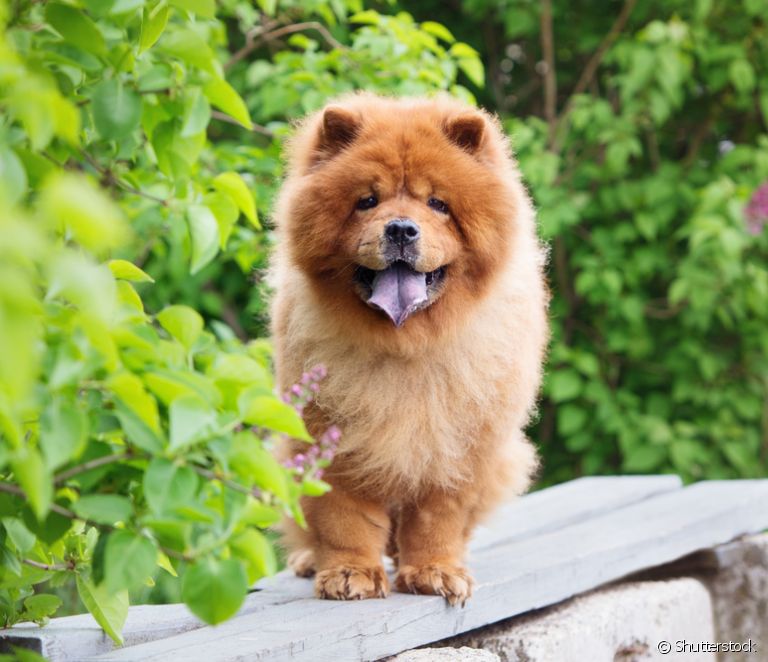
Table of contents
The Chow Chow is a dog originally from China whose main characteristic is its blue (or purple) tongue. In addition, there are other striking features in the Chow Chow: medium-sized, this is a dog with a dense and abundant coat that resembles a teddy bear. You may have seen a Chow Chow puppy and melted with cuteness, but do you know what the personality of this dog is like? This is a breedwho has a more dominant, independent and even slightly stubborn demeanor, which may be unexpected for many guardians who rely on the cute appearance of the Chow Chow puppy.
When it comes to the Chow Chow, personality is something that stands out for many reasons - and it's important that those interested in owning a Chow Chow puppy do their research. We've put together some important information about the temperament of Chow Chows to help you decide if you're the right guardian for them!
What defines a dog's personality?
Understanding canine behavior and the different types of personality that accompany each pet is not a difficult task. Some genetic issues are involved in this process: there are dog breeds that carry very instinctive behaviors that are linked to their origin, such as a guard dog or a herding dog. But did you know that this is not the only thing that defines personality?The way each dog is raised also influences the "bottom line".
The Chow Chow dog, for example, is a naturally more reserved breed with a reputation for stubbornness. The quieter way may remain, but stubbornness can be corrected with training techniques. That is, you can make the blue-tongued dog more obedient, if you know how to educate him correctly! The different relationships are also impacted by the creation: the sooner the dog is socialized andaccustomed to living with groups outside his daily life, the better he relates.
Chow Chow personality: everything you need to know
The personality of the Chow Chow (the famous blue-tongued dog) is one of the questions that most intrigues lovers of the breed. For starters, even though he seems like a very cuddly and friendly dog, the Chow Chow has a variable mood. Sometimes he wants to be close, sometimes he prefers to stay in his corner - and that's okay. For the Chow Chow, family is important, but he also values his own.independence and individuality.
In terms of energy, the breed is not one of the most active. They are extremely calm dogs, without destructive habits and that hardly bark. The Chow Chow breed is one of the easiest to be raised by those who have a busy routine, and fits as a great dog for an apartment (even though it is not exactly small). Other characteristics that stand out in the Chow Chow are their stubbornness and territorialismHowever, the breed can be trained and socialized with the right tricks.
One question that may arise - and that may interfere with the personality of the breed - is how to know if the Chow Chow is pure. The answer is quite simple: just analyze the color of the animal's tongue. If it has a pinker color it is because it was crossed with another breed that altered its genetics. In Chow Chow, blue and purple are the only possible tongue colors. Another tactic is to observe how many teeth the animal has.has, because this is the only breed with 44 teeth (the others have 42), and the size: there is no such thing as a small Chow Chow dog and even less a giant Chow Chow, for example, only medium to large dogs.
Below, check out an overview of everything about the Chow Chow breed and its personality!
Is Chow aggressive?
It's hard not to recognise a Chow Chow dog: furry and fluffy, the breed stands out anywhere and catches the eye. With its dense and impressive coat, the Chow Chow is an imposing dog, but if well trained, it's not particularly aggressive. They are very loyal to their owners, but don't really like to be held or handled when they're not in the mood. For this reason, they are best suited tofamilies with older children, who are more aware of the limits when dealing with animals.
Basically, the Chow Chow maintains a good family relationship, but is not so close with anyone he doesn't know and tends to be a bit impatient with very young children. Visitors should be warned not to be too invasive with the animal's space, which can arouse more rough (but not necessarily violent) behavior. That said, Chow Chows usually get along well with children, fromthat are accustomed to them from puppyhood.
How Chow Chow and its guardian live together
The loyalty of the Chow Chow breed is more with one person than with several. Many breeds of dog become attached to their immediate guardian and their families with similar intensity, but not the Chow Chows. While it is possible for them to form friendly bonds with their guardian's entire family, this breed tends to pick one person to devote themselves to. So don't expect the Chow Chow dog - big as it is - toobey any resident: he will probably have a closer relationship with only one person.
With this in mind, the Chow Chow is a good choice for those who live alone and want a great furry friend. He will always be very loyal and faithful to you, and will not leave your side in times of need.
Chow Chow puppy is independent and reserved
The Chow Chow is the ideal dog for those who appreciate the independence of their pet, but who, at the same time, are able to delimit limits. This is because, if it depends on the puppy, he follows his own rules. It is necessary to know how to conduct the situation so that everything goes well with the dog with the purple tongue and, at the same time, understand that the Chow Chow is an animal that likes to have its space and moments morebooked from time to time, without anyone pushing it.
In general, a stern verbal warning is enough to get the Chow Chow to stop mischief. The ideal dynamic between a guardian and his Chow Chow is one in which the pet's independence is respected, as long as he follows the rules set by the guardian.
How does the Chow Chow get along with children and strangers?
Chow Chows aren't particularly sociable, so if you're looking for a puppy to take to the park and make new canine friends with, the Chow Chow may not be the best option, as they tend to exhibit aggressive behavior towards other dogs. The breed is known for being more reserved and not liking anyone invading their space, so the dog's relationship with the tongue is a bit of a challenge.Socialization is a way to mitigate this and improve coexistence with the Chow Chow dog breed.
Chow Chows tend to ignore affectionate advances from other people, i.e. those who are not part of their family. In addition, the purple-tongued dog is often very suspicious. It is good to warn visitors that, despite having a puppy, the Chow Chow breed does not like to be bothered by those who do not know it. For these reasons, the dog is also not very suitable for families with children.children (unless they grow up accustomed to this relationship).


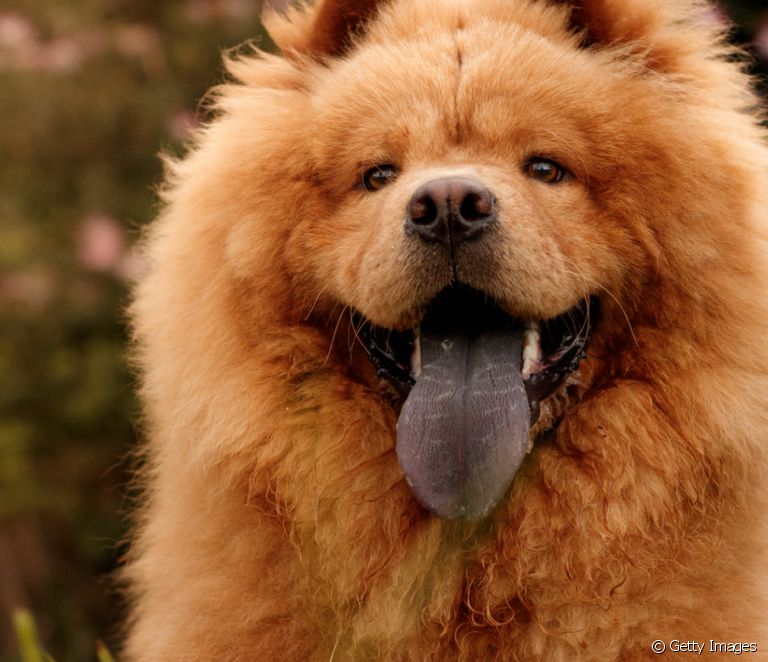
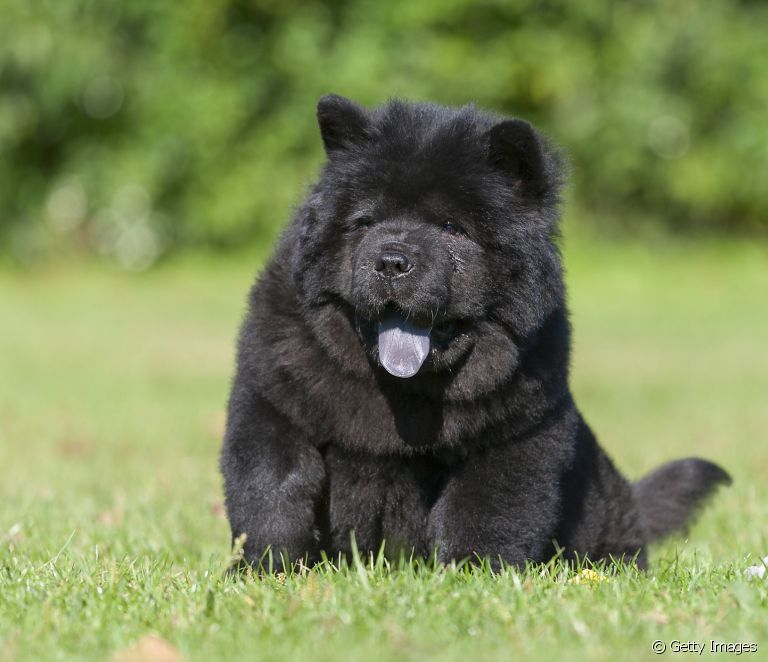
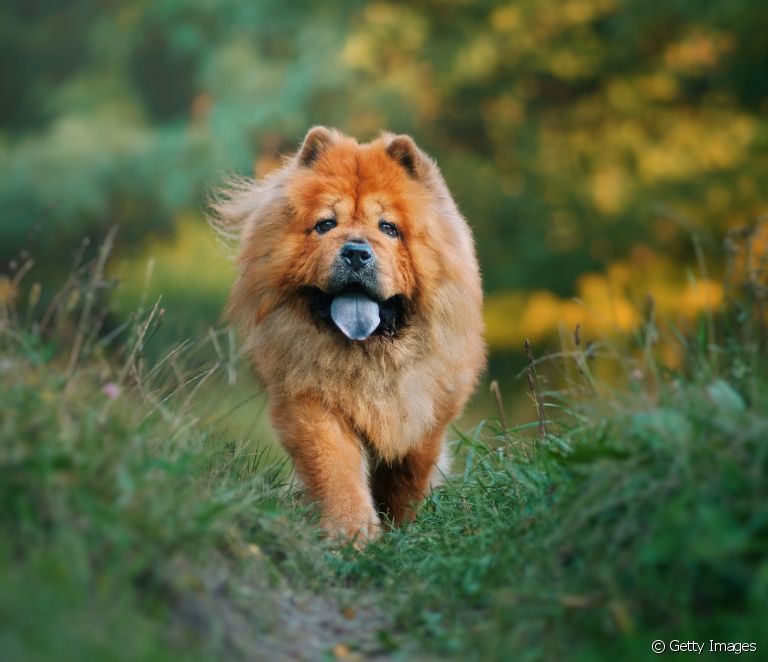
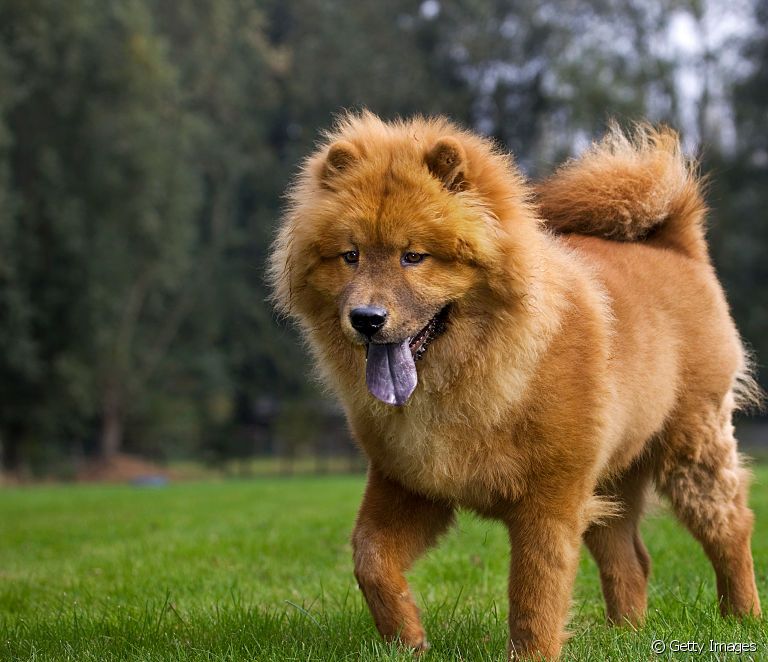
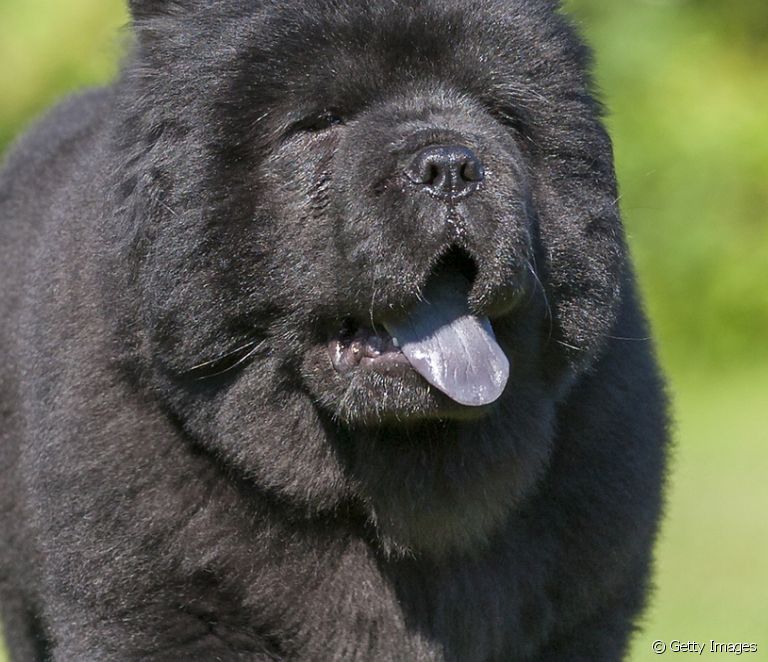
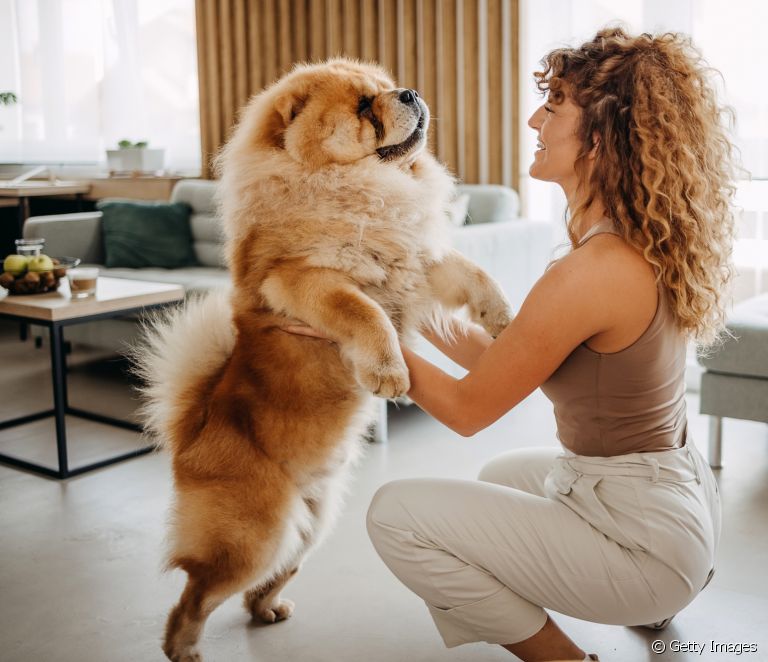
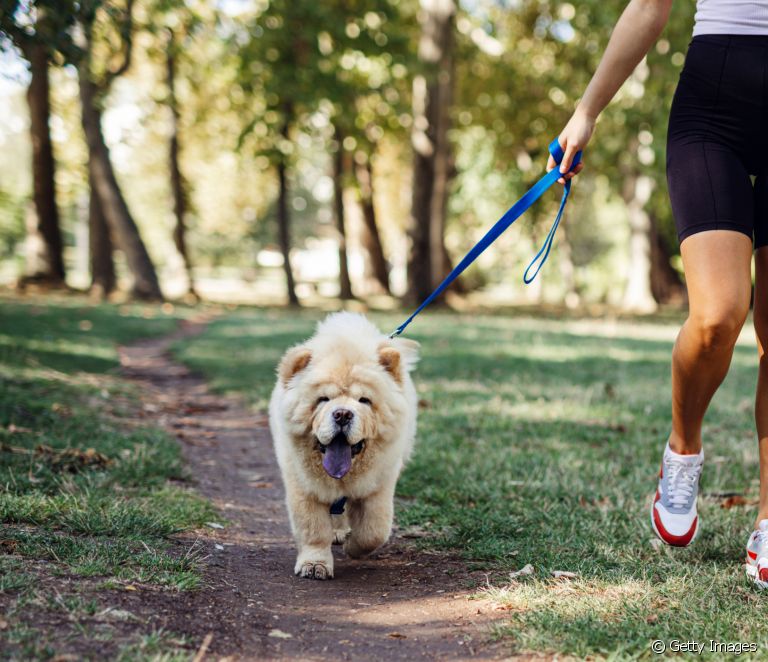
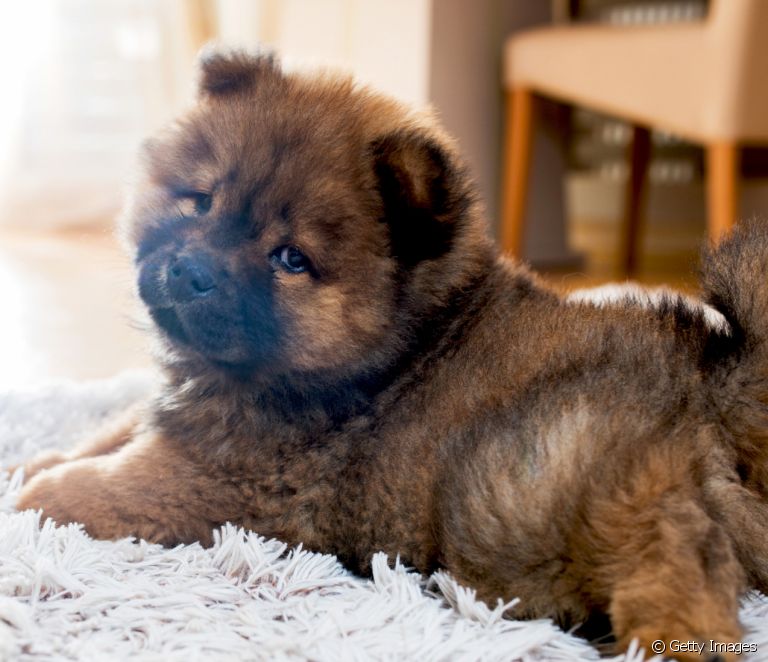
Chow Chow breed is not usually destructive
Many guardians are used to coming home and finding slippers, remote controls and other household items chewed up. With the Chow Chow dog, this risk tends to be lower, as they are usually calm and reserved, not showing aggression until the time they feel they are being threatened or disturbed. This means that, as far as the Chow Chow is concerned, dogs do not chew on things.has destructive behaviors because of boredom or any other reason.
Generally, the Chow Chow puppy (black or fawn) is a little more curious and exploratory, but won't destroy your home for it. The adult Chow Chow, on the other hand, is quite calm and usually adapts well in any space, being able to be alone for several hours without causing a fuss.
Does the Chow Chow dog breed bark a lot?
Among dog breeds, the Chow Chow stands out as a dog that hardly barks! Despite its stubbornness, the little dog will hardly vocalize if there is no good reason for it. It is common for barking to occur when the animal is bothered by some situation or if someone tries to invade its space, for example. But, apart from these occasions, in everyday life it is very rare to find a Chow Chowbarking.
See_also: Saluki: 10 things you need to know about the large dog breedIn order to facilitate communication with your four-legged friend, it is important to understand the minimum of canine language. Dog barks can have different meanings, and to know exactly what the Chow Chow breed (puppy or adult) wants to convey, the guardian must be attentive to the signs and know the pet itself very well.
Chow Chow: stubbornness is a strong personality trait of the blue-tongued dog
One of the most striking characteristics of a primitive Chow Chow's personality is its stubbornness. This comes largely from the dominant behavior typical of the breed: this is a dog that simply has a hard time following orders and always tries to take the reins of the situation, as if he were the leader. They do what they think is right, so it is important to set limits and demonstrate who is who"The Chow Chow breed of dog is very determined, so it is recommended that training takes place when it is still a puppy.
Is it possible to train a Chow Chow?
Dog training is important to curb some of the Chow Chow's tendencies. The dog is suitable for experienced owners, as they can have some annoying behavioral tendencies. Originally a guard dog, the Chow Chow can become extremely territorial, barking at everything and even showing aggression towards other animals and/or strangers. The idealis to invest in training from an early age!
The Chow Chow is not among the most intelligent dogs in the world, but it can learn obedience commands if the guardian has a firm hand and knows how to educate it. Positive reinforcement helps to achieve good results in this regard, so use and abuse rewards such as treats, affection, praise and toys to attract your pet's interest. However, keep in mind that, because it is stubborn, the dogThe blue-tongued Chow Chow doesn't take orders at first and you have to be very patient and persistent in the process. Chow Chow training is not impossible, it's just a bit more laborious.
Chow Chow doesn't have as much energy, but needs to be exercised often
In addition to being known as the "blue tongue" dog, the Chow Chow is among the laziest dog breeds! And this fame has a huge background of truth: the breed, in fact, is not very busy and much prefers to spend an afternoon resting than running around the house and playing. But don't get carried away by their laziness: the Chow Chow dog, even though it is not very active, needs tophysical and mental stimuli in your routine.
A sedentary lifestyle is a big problem in the life of this breed of dog. Without exercise and physical activity, the Chow Chow has great chances of becoming obese. To prevent this from happening, walking the dog for short distances and promoting environmental enrichment for the pet are attitudes that help - a lot - to make the Chow Chow dog healthy.
The correct socialization of the Chow Chow puppy is super important
Receiving a baby Chow Chow at home is one of the greatest wonders! But in addition to all the cuteness of the puppy, the guardian must take special care. It is at this stage that the personality of the puppy begins to take shape. Therefore, making the socialization and the correct training of the animal are the duties of the family. If the Chow Chow dog breed grows up accustomed to a certain movement of different people andanimals in her daily life, she will feel less uncomfortable and suspicious in adulthood. In other words, the Chow Chow becomes much more receptive - within his limits - when he is socialized from an early age.
Tips for living better with the Chow Chow breed
Now that you know everything about Chow Chow, it's time to know how to best live with the breed and adapt it to the new house! We have separated some valuable tips to maintain a good coexistence between you:
1) Training the Chow Chow should be as early as the first few months. When the dog becomes an adult, the stubborn personality stands out and the process becomes more difficult.
2) When training a Chow Chow dog, the tutor should invest in positive stimuli Instead of punishing him when he doesn't obey, offer rewards when the Chow Chow has a desired reaction.
3) The socialization of the Chow Chow puppy should begin after the vaccines have been administered. With the puppy fully immunized, he can now start to live with people outside his family cycle so that he is not so suspicious.
4) It is good to warn visitors that the Chow Chow is not a fan of touches and too much proximity. Even if you feel like cuddling the breed, it is important to respect the animal's space and avoid touches that may be uncomfortable for it.
5) Chow Chow should not be left alone with children. The dog is not aggressive, but some games played by the little ones can displease the Chow Chow breed and, as a consequence, the animal will react.

